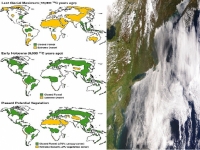Business
CLIMATE CHANGE IS ALREADY PREVENTING PEOPLE FROM ESCAPING POVERTY
STATEMENT FROM THE WORLD BANK

COP21
USPA NEWS -
Climate change is already preventing people from escaping poverty, and without rapid, inclusive and climate-smart development, together with emissions-reductions efforts that protect the poor, there could be more than 100 million additional people in poverty by 2030, according to a new World Bank...
Climate change is already preventing people from escaping poverty, and without rapid, inclusive and climate-smart development, together with emissions-reductions efforts that protect the poor, there could be more than 100 million additional people in poverty by 2030, according to a new World Bank Group report released before the international climate conference in Paris.
Below, part of the Statement given by The World Bank on November 8, 2015, in Washington, D.C. :
Below, part of the Statement given by The World Bank on November 8, 2015, in Washington, D.C. :
'The report, Shock Waves: Managing the Impacts of Climate Change on Poverty, finds that poor people are already at high risk from climate-related shocks, including crop failures from reduced rainfall, spikes in food prices after extreme weather events, and increased incidence of diseases after heat waves and floods. It says such shocks could wipe out hard-won gains, leading to irreversible losses, driving people back into poverty, particularly in Africa and South Asia.'
'The report finds that the poorest people are more exposed than the average population to climate-related shocks such as floods, droughts, and heat waves, and they lose much more of their wealth when they are hit. In the 52 countries where data was available, 85 percent of the population live in countries where poor people are more exposed to drought than the average. Poor people are also more exposed to higher temperatures and live in countries where food production is expected to decrease because of climate change.'
'Agriculture will be the main driver of any increase in poverty, the report finds. Modeling studies suggest that climate change could result in global crop yield losses as large as 5 percent by 2030 and 30 percent by 2080. Health effects“”higher incidence of malaria, diarrhea and stunting“”and the labor productivity effects of high temperatures are the next-strongest drivers.'
'In focusing on impacts through agriculture, natural disasters and health, the report calls for development efforts that improve the resilience of poor people, such as strengthening social safety nets and universal health coverage, along with climate-specific measures to help cope with a changing climate, such as upgraded flood defenses, early warning systems and climate-resistant crops.'
'In poor countries, support from the international community will be essential to accomplish many of these measures, according to the report. This is particularly true for investments with high upfront costs-- such as urban transport or resilient energy infrastructure -- that are critical to prevent lock-ins into carbon-intensive patterns.'
Ruby BIRD
http://www.portfolio.uspa24.com/
Yasmina BEDDOU
http://www.yasmina-beddou.uspa24.com/
Ruby BIRD
http://www.portfolio.uspa24.com/
Yasmina BEDDOU
http://www.yasmina-beddou.uspa24.com/
Ruby Bird Yasmina Beddou World Bank Group Washington Climate Change Escaping Poverty People Prevention Protect 2030 Report Conference Paris Shock Waves Managing The Impacts Of Climate Change On Poverty
Liability for this article lies with the author, who also holds the copyright. Editorial content from USPA may be quoted on other websites as long as the quote comprises no more than 5% of the entire text, is marked as such and the source is named (via hyperlink).






